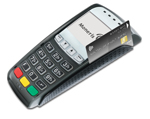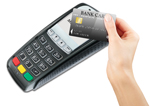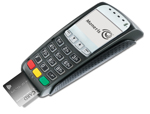
There are four methods of entering credit and debit card information on the iPP320 PIN Pad:
● Swipe
● Tap
● Insert
● Manual
Click on the links to learn more.
Follow these instructions to swipe a credit or debit card on the iPP320 PIN Pad's magnetic stripe reader.
NOTE: If the card has a chip, it must be inserted (see Insert: Chip Cards below.)
The iPP320 PIN Pad displays "SWIPE OR INSERT CARD" or "SWIPE, TAP OR INSERT CARD".
You or the customer swipes the card on the PIN Pad's magnetic stripe reader.
NOTE: If the card is a credit card, you should swipe the card. If the card is a debit card, the customer will be prompted to enter a PIN.

● Hold the iPP320 PIN Pad with one hand, and swipe the card in the magnetic stripe reader with the other hand. This will prevent the PIN Pad's internal contactless reader from inadvertently reading the card data as a contactless transaction.
Follow these instructions to tap or wave a contactless debit or credit card (or mobile form factor) on the iPP320 PIN Pad's embedded contactless reader.
The PIN pad displays "SWIPE, TAP OR INSERT CARD".
The customer taps/waves their card over the PIN Pad's display screen.

Note the following :
Only Sales and Refunds can performed as contactless transactions.
The customer will not be prompted for a PIN.
The transaction amount must be equal to or less than the maximum Contactless Dollar Value set for the card.
The iPP320 PIN Pad beeps and four green lights flash when the contactless reader is reading the card data.
● The card must be within 0.5 in. (1.3 cm) of the PIN Pad's display screen, but it does not have to touch it.
● The card must be tapped or waved by itself. It should not be waved while in a wallet with other cards.
To determine the maximum CDV for a card type, contact us at 1-855-423-PAYD (7293).
● Credit cards: If a credit card is tapped for an amount that exceeds its maximum CDV, the PIN Pad will display "CONTACTLESS TRANSACTION LIMIT EXCEEDED". Insert the chip credit card instead.
● Debit cards: If a debit card is tapped for an amount that exceeds its maximum CDV, the PIN Pad will display "MUST INSERT CARD". Insert the chip credit card instead.
Follow the instructions below to properly insert a chip credit or debit card into the iPP320 PIN Pad's chip reader.
The iPP320 PIN Pad displays "SWIPE OR INSERT CARD" or "SWIPE, TAP OR INSERT CARD".
The customer inserts their card into the PIN Pad's chip reader.
NOTE: Unless the PIN Pad prompts otherwise, the card should not be swiped even if it has a magnetic stripe.

The customer may be prompted to enter data, including their PIN.
The customer leaves the chip card inserted until the "REMOVE CARD" prompt displays on the iPP320 PIN Pad.
● Hold the PIN Pad with one hand, and insert the card in the chip reader with the other hand. This will prevent the iPP320 PIN Pad's contactless reader from inadvertently reading the card data as a contactless transaction.
If all available card entry methods fail, you may manually enter the card number for credit cards and some chip debit cards on the iPP320 PIN Pad.
On the left pane of the Payments screen, tap Credit Card.
On the right pane, tap the Manual Entry button.
Follow the prompts on the PIN Pad.
Enter the credit card number:
At the "SWIPE, TAP OR INSERT CARD" prompt, key in the credit card number. Press the green  key when finished.
key when finished.
At the “EXPIRY DATE” prompt, enter the card’s 4-digit expiry date in MM/YY format. Press the green  key when finished.
key when finished.
Tap OK.
Wait while the transaction processes.
Follow the prompts on the screen to complete the transaction.